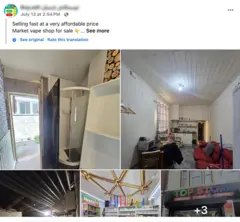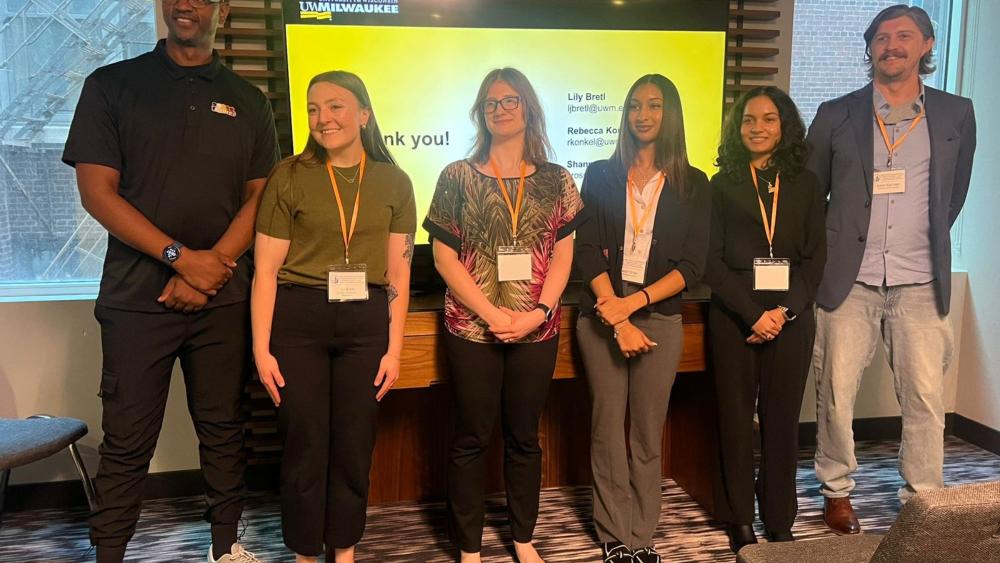Crime network behind UK mini-marts is enabling migrants to work illegally – BBC

Report on an Organised Crime Network’s Impact on Sustainable Development Goals in the UK
An investigation has uncovered a UK-wide organised crime network enabling migrants to work illegally, primarily in mini-marts. This network’s activities directly contravene several key United Nations Sustainable Development Goals (SDGs), particularly those concerning decent work, justice, health, and inequality.
Violations of Decent Work and Economic Growth (SDG 8)
The network’s operations represent a significant challenge to the principles of SDG 8, which promotes sustained, inclusive, and sustainable economic growth, full and productive employment, and decent work for all.
H3: Exploitation of Vulnerable Migrant Labour (Target 8.7 & 8.8)
- Asylum seekers, who generally lack the right to work, are employed in exploitative conditions.
- Workers reported enduring 14-hour shifts for wages as low as £4 per hour, far below the national minimum wage.
- This system constitutes a form of modern slavery and undermines the protection of labour rights for all workers, especially the most vulnerable.
H3: Promotion of Illicit and Informal Economies (Target 8.3)
- The network operates outside the formal economy, relying on cash transactions and evading taxes, including council tax and utility payments through meter tampering.
- The primary business model is the sale of illegal goods, which undermines legitimate businesses and fair competition.
- This informal structure prevents the creation of decent jobs and inhibits sustainable economic development in affected communities.
Threats to Peace, Justice, and Strong Institutions (SDG 16)
The criminal enterprise actively undermines the rule of law and the integrity of national institutions, directly conflicting with the aims of SDG 16 to promote peaceful and inclusive societies and build effective, accountable institutions.
H3: Organised Crime and Illicit Financial Flows (Target 16.4)
- The investigation identified a network of over 100 businesses, including mini-marts, barbershops, and car washes, linked to a small number of individuals.
- The core of the criminal model involves the use of “ghost directors,” who are paid up to £300 per month to register dozens of businesses in their names, obscuring the true operators.
- This structure facilitates illicit financial flows from the sale of illegal tobacco and vapes, with reported weekly profits reaching up to £3,000 per shop.
H3: Circumvention of Institutional Oversight (Target 16.6)
- The network exploits systemic weaknesses in the Companies House registration process, allowing individuals to be named as directors of numerous businesses with minimal scrutiny.
- Companies are frequently dissolved and re-established with minor alterations to names and personal details to evade detection by authorities.
- This practice erodes the effectiveness and transparency of corporate governance and regulatory bodies such as Trading Standards and Immigration Enforcement.
Negative Impacts on Health, Well-being, and Inequality (SDG 3 & SDG 10)
The activities of the network have severe consequences for public health and exacerbate social inequalities, running counter to SDG 3 (Good Health and Well-being) and SDG 10 (Reduced Inequalities).
H3: Public Health Risks (Target 3.a)
- The businesses systematically sell counterfeit and smuggled cigarettes and vapes, which do not meet UK safety and regulatory standards.
- These illicit products are sold to the public, including minors, with one operator admitting to selling to customers as young as 12.
- This illicit trade directly undermines national and international efforts to control tobacco and protect public health.
H3: Exacerbating Inequality (Target 10.7)
- The network preys on the vulnerability of asylum seekers, exploiting their precarious legal and financial situations.
- The businesses are predominantly located in deprived areas across the UK, from Dundee to south Devon, concentrating criminal activity and its negative social impacts in already disadvantaged communities.
- By facilitating illegal work and migration, the network undermines orderly, safe, and regular migration processes.
Institutional Response and Systemic Weaknesses
The findings have prompted a response from UK authorities, highlighting both ongoing enforcement efforts and significant institutional vulnerabilities that allow such networks to operate.
H3: Official Statements and Actions
- The Home Office has committed to investigating the findings and reiterated its focus on tackling illegal working and organised crime.
- Companies House stated it now possesses greater powers to share intelligence with law enforcement partners to combat criminality.
- The government reports a 51% increase in enforcement raids and has raised fines for businesses employing illegal workers to £60,000 per person.
H3: Identified Vulnerabilities
- The ease with which fraudulent information can be submitted to Companies House remains a critical weakness.
- Financial penalties for selling illegal goods are often insufficient to deter criminal activity, as the potential profits far outweigh the fines.
- The network’s methods, including the use of hidden compartments and providing false identities, demonstrate a calculated strategy to circumvent enforcement actions by Trading Standards and immigration officers.
Analysis of the Article in Relation to Sustainable Development Goals
1. Which SDGs are addressed or connected to the issues highlighted in the article?
- SDG 3: Good Health and Well-being: The article discusses the widespread sale of illegal and unregulated vapes and cigarettes, which poses significant health risks. It specifically highlights the sale of these products to minors, directly undermining public health objectives.
- SDG 8: Decent Work and Economic Growth: The investigation uncovers severe labor exploitation, with asylum seekers working illegally for extremely low wages (£4 per hour) and long hours (14-hour shifts). This is the antithesis of decent work and promotes a harmful informal economy.
- SDG 10: Reduced Inequalities: The criminal network preys on the vulnerability of asylum seekers who are in “legal limbo,” exploiting their precarious status. This deepens inequalities by trapping a marginalized group in an illegal and exploitative system.
- SDG 16: Peace, Justice and Strong Institutions: This is a central theme. The article details an organized crime network, illicit financial flows (tax evasion, profits from illegal sales), corruption (use of “ghost directors”), and weaknesses in public institutions like Companies House and law enforcement, which fail to prevent these activities.
2. What specific targets under those SDGs can be identified based on the article’s content?
-
Under SDG 3 (Good Health and Well-being):
- Target 3.a: Strengthen the implementation of the World Health Organization Framework Convention on Tobacco Control. The article’s focus on the sale of “counterfeit or smuggled cigarettes for about £4 per pack” and illegal vapes, including to children as young as 12, demonstrates a direct contravention of tobacco control measures.
-
Under SDG 8 (Decent Work and Economic Growth):
- Target 8.7: Take immediate and effective measures to eradicate forced labour, end modern slavery and human trafficking. The conditions described, such as asylum seekers working “14-hour shifts in mini-marts for as little as £4 per hour,” represent severe labor exploitation that aligns with the goals of this target.
- Target 8.8: Protect labour rights and promote safe and secure working environments for all workers, including migrant workers. The entire scheme is built on violating the labor rights of migrant workers (asylum seekers), who are employed illegally and have no legal recourse or protection.
-
Under SDG 10 (Reduced Inequalities):
- Target 10.7: Facilitate orderly, safe, regular and responsible migration and mobility of people. The criminal network thrives on the irregular status of asylum seekers, whose claims have been rejected or are in “legal limbo.” This creates an incentive for illegal work and migration, undermining well-managed migration policies.
-
Under SDG 16 (Peace, Justice and Strong Institutions):
- Target 16.4: Significantly reduce illicit financial and arms flows… and combat all forms of organized crime. The article is a direct exposé of an organized crime network engaged in illicit trade. It mentions “weekly takings from illicit tobacco at his shop could be ‘sometimes, up to £3,000’,” which constitutes an illicit financial flow.
- Target 16.5: Substantially reduce corruption and bribery in all their forms. The use of “ghost directors” who are “paid to put their names to official paperwork” for a fee of “£250 and £300 a month” is a form of corruption designed to obscure ownership and facilitate illegal activities.
- Target 16.6: Develop effective, accountable and transparent institutions at all levels. The article reveals significant weaknesses in institutions. It notes how companies are “dissolved after about a year, and then re-opened” to evade scrutiny, highlighting loopholes in Companies House, which is described as only now having “greater powers to share information.”
3. Are there any indicators mentioned or implied in the article that can be used to measure progress towards the identified targets?
-
For Target 3.a:
- Prevalence of illicit tobacco sales: The article indicates that all but one of the shops visited sold illegal cigarettes at a significantly lower price (“£4 per pack, instead of the average UK price of £16”). This price disparity is a clear indicator of the scale of the illicit market.
- Incidence of selling tobacco/vapes to minors: The article explicitly mentions sales to “a group of teenagers,” a “12 year old,” a “14-year-old,” and a “16-year-old,” which can be tracked as an indicator of failed enforcement.
-
For Targets 8.7 and 8.8:
- Wages and working hours in the informal sector: The specific example of a worker earning “£60 to £65 [per day]” for a “14-hour day” (approximately £4.28-£4.64 per hour) serves as a direct indicator of exploitative labor practices.
- Number of illegally employed migrants: The investigation links “more than 100 mini-marts, barbershops and car washes” to the network, implying a significant number of illegally employed individuals.
-
For Target 16.4:
- Scale of organized crime networks: The identification of “four individuals” acting as ghost directors for “more than 100 company directorships” provides a quantifiable measure of the network’s structure.
- Value of illicit financial flows: The statement that a single shop can generate “up to £3,000” weekly from illicit tobacco provides a basis for estimating the financial scale of these operations.
- Number of enforcement actions: The article mentions that “Seventeen shops registered under the names of Mr Ahmad Ali and Mr Farzanda have been raided since 2021,” which is a direct indicator of law enforcement activity.
-
For Targets 16.5 and 16.6:
- Number of fraudulent company registrations: The pattern of companies being “set up for a year, dissolved, and then set up again” with altered names is a measurable indicator of institutional abuse.
- Number of disqualified directors: The article notes that one ghost director “had been disqualified from being a company officer for five years,” an official statistic that can be tracked.
Table of SDGs, Targets, and Indicators
| SDGs | Targets | Indicators |
|---|---|---|
| SDG 3: Good Health and Well-being | 3.a: Strengthen the implementation of the WHO Framework Convention on Tobacco Control. |
|
| SDG 8: Decent Work and Economic Growth | 8.7: Eradicate forced labour and end modern slavery.
8.8: Protect labour rights and promote safe and secure working environments for all workers, including migrant workers. |
|
| SDG 10: Reduced Inequalities | 10.7: Facilitate orderly, safe, regular and responsible migration and mobility of people. |
|
| SDG 16: Peace, Justice and Strong Institutions | 16.4: Significantly reduce illicit financial flows and combat all forms of organized crime.
16.5: Substantially reduce corruption and bribery. 16.6: Develop effective, accountable and transparent institutions. |
|
Source: bbc.com
What is Your Reaction?
 Like
0
Like
0
 Dislike
0
Dislike
0
 Love
0
Love
0
 Funny
0
Funny
0
 Angry
0
Angry
0
 Sad
0
Sad
0
 Wow
0
Wow
0













































































